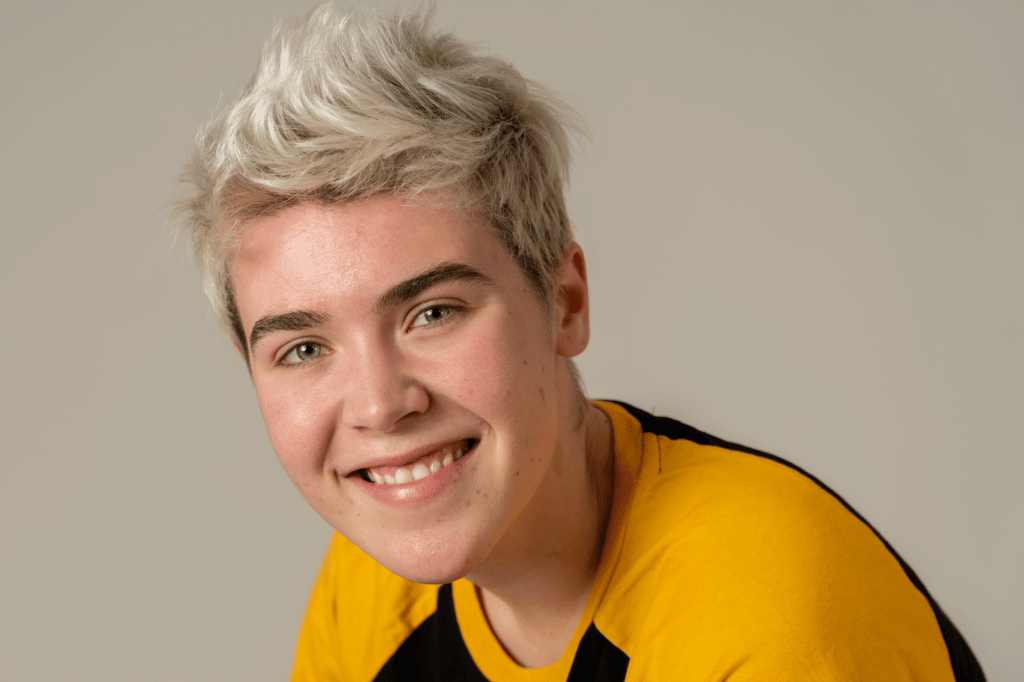Your child recently came to you and said some unexpected words: “I’m trans.”
Or maybe they said something like “I’m non-binary,” “I’m genderfluid,” “I’m agender” or some variation you’ve only heard a little about or have never heard of at all. Perhaps those words weren’t really all that unexpected, or you haven’t heard them yet but you did anticipate hearing them sometime soon.
First off, let me say: congratulations. No matter how challenging your relationship is or has been with your child, it’s quite likely that they’re telling you this because they value your affirmation and presence in their life enough to invite you into this deeply personal, sometimes quite frightening, aspect of their life. That’s a big deal—big enough to take a deep breath and pause before responding.
Here’s what we know: rejection of your child’s gender identity is a major risk factor for depression, as well as attempts at suicide (Trevor Project, 2021). I’m not saying that to scare you or to pile on the pressure, of course—you’re probably already facing enough of that. Instead, I share that fact to highlight the amazing opportunity you currently have in your hands. This is a chance to walk the walk and really show up for your kid in a manner they’ll likely remember for a lifetime. See, we also know that having even one accepting and supportive adult in a young adult or adolescent’s life can reduce the risk of a suicide attempt by 40% (Trevor Project, 2019). This is your chance to be that adult.
You probably have questions. Let me help you out.
Is this just a phase?
Maybe you poked around online and found some scary terms like “irreversible damage” and “rapid-onset” gender dysphoria. That last term, of course, gets thrown around despite research confirming that, while gender dysphoria is absolutely real and potentially devastating, the “rapid-onsent” idea is a myth (Ashley 2020; Turban et al 2022). In fact, of the 8% of persons who transition and then go on to detransition later on, only 5% of that number permanently “detransition” because they “felt that transition was not right for them”—whereas 36% report detransitioning because of pressure from their parents (GenderGP, 2021).
But isn’t this all just the result of peer pressure?
Believe it or not, there actually isn’t any evidence that peer pressure leads to any change in gender identity (Turban et al 2022). If you’re suddenly noticing that most of your child’s social circle is made up of gender-nonconforming kids, it might be tempting to think that somehow that social circle made your kid trans. But here’s another, even more plausible explanation: people hang out with who they relate to, and who they feel safe with.
But aren’t they just too young to know?
This question is completely understandable, and is likely coming from a good place. Here’s something to keep in mind, though: no one asks whether non-LGBTQIA+ kids are “too young” to know that they’re not LGBTQIA+. In all likelihood, your child knows their gender just the same way that you did when you were their age.
Okay, so—what can I do to help my child?
If you’re reading this, that’s a great first step. Ask them questions. Ask them, with genuine curiosity, to tell you their gender story. Look up and read and listen to the stories of other trans and gender-nonconforming people. And remember: you’re not losing anything. Your child is still your child—now, you’re just learning how magical they really are.
References
- Ashley, F. 2020. A Critical Commentary on “Rapid-Onset Gender Dysphoria.” Sociological Review Monograph 68(4): 779-799.
- GenderGP. 2021. “Detransition Facts and Statistics 2022: Exploding the Myths around Detransitioning.” https://www.gendergp.com/detransition-facts/
- The Trevor Project. 2021. “Facts About LGBTQ Youth Suicide.” https://www.thetrevorproject.org/resources/article/facts-about-lgbtq-youth-suicide/
- The Trevor Project. 2019. Research Brief: Accepting Adults Reduce Suicide Attempts Among LGBTQ Youth. https://www.thetrevorproject.org/research-briefs/accepting-adults-reduce-suicide-attempts-among-lgbtq-youth/
- Turban, J; Dolotina, B.; King, D., Keuroghlian, A. 2022. “Sex Assigned at Birth Ratio Among Transgender and Gender Diverse Adolescents in the United States.“ Pediatrics 150(3): e2022056567. 10.1542/peds.2022-056567










